Seniors Find Meaning in Music
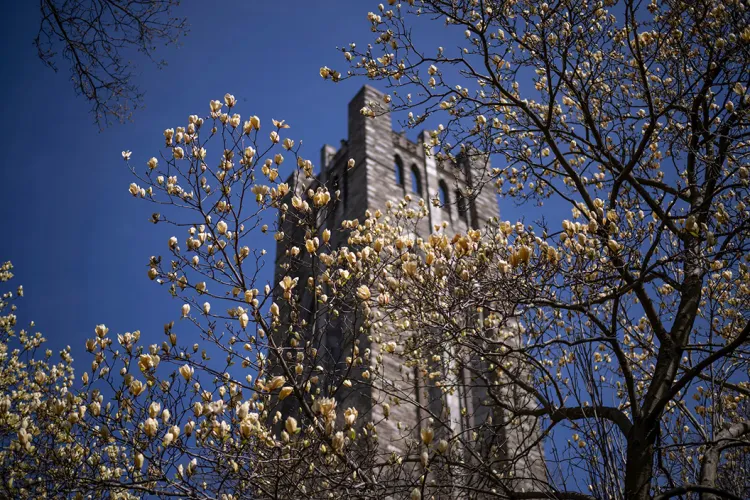
The Swarthmore journeys of music majors and minors Dessa Caguioa ’24, Jorge Padilla ’24, Lauren Park ’24, Mark Reyes ’24, and Eric Trinh ’24 are nearing an end. During the academic year, the seniors reflected on the transformative impact of their studies and looked ahead to futures filled with musical endeavors, both professional and personal. Additional music senior stories will be published in the following week.
Dessa Caguioa ’24

By Bohou Zhang '27
Dessa Caguioa ‘24’s musical journey began in an unlikely place. “It started with the animated kids show Little Einsteins and snowballed from there,” she says. “I really wanted to be the kid in the show who could play all the instruments.”
After discovering a musical conservatory in her neighborhood mall, she convinced her mother to enroll her in piano lessons. By high school, she’d joined the marching band. “My friends in Hawaiʻi all knew how much I loved music,” she says. Coming into Swarthmore, however, she wasn’t sure that music was an option. “I was actually planning on being a Japanese major . . . I didn’t think doing music at Swarthmore was possible back then,” she says. “I knew Swarthmore didn’t have a marching band program there and I was joining during the height of the pandemic.”
After exploring Japanese and Sociology & Anthropology classes, Caguioa took Music 11 (Harmony, Counterpoint, and Form) with Professor Jon Kochavi. “This was what made me think ‘Oh, I can really stick with this.’” It was her introduction to the program and what began her involvement with music at Swarthmore. Since then, she’s been a part of the Wind Ensemble, Chorus, and Garnet singers, and she’s composed original works, finding fulfillment in the creative expression that the process enables.
“There’s a real lack of non-cis male composers,” Caguioa says, “so having people willing to support you even though you may be the only fem composer is amazing.” For her, the most endearing aspect of the Swarthmore music department is the warmth and acceptance from the faculty and students. She described her experiences with imposter syndrome, feeling under-represented, and struggling to find where she belonged. “I needed the trust of those around me,” she says, “and I found that at Swarthmore.”
Her works have included arrangements of Hawaiʻi Aloha and The Last Rose of Summer, performed by the Garnet Singers and Wind Ensemble respectively, and the original composition, Journey, for organ, performed by Mark Loria as part of the Composer’s Showcase. Two more of her original works, Homeward and Elegy, will be performed this spring by the Wind Ensemble and the Garnet Singers.
The core of Dessa’s musicianship revolves around music composition. She enjoys being left to her own devices so she can pour her emotions into her work. “I love composing, but that’s often a solitary activity,” she muses, “and it gets lonely sometimes.” She supplements her composing with collaborative performances with other musicians.
“I took ‘Music, Space, and Place in Medieval Europe’ a year or two ago,” she remembers fondly, “and I got to sing in European cathedrals with the other students.” Having this sense of community within the College helped her develop her art and kept the aspects of composition and performance balanced.
Watching her pieces be performed can be a conflicting experience for her. “It’s very difficult sometimes,” she says. “It’s like watching others interpret a part of yourself.” Caguioa finds that for her, the pieces she writes are filled with emotion. It’s elating to have her work performed, but can be nerve wracking watching others express her personal feelings in their performance. “What role does the composer play in the music-making process?” she asks. “Yes, they compose the music, but do they really have control over how it’s performed?”
After graduation, Caguioa is hoping to go to the University of Hawaiʻi at Manoa in the music composition program. “I want to watch over my little sister,” she says, “and I want to take time further building up my composition portfolio.”
At the end of her journey, she looks back on her time at Swarthmore fondly. “The fact that I was given a space to explore composing to its fullest, that was this program’s biggest strength. It’s not imposing itself on anyone.”
Jorge Padilla ’24
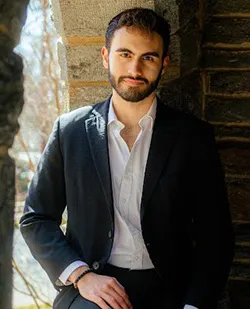
By Chung Sze Kwok ’27
For Jorge Padilla ’24, music is a calling, one that he found during his time at Swarthmore. An opera singer, performer and producer of original music, Padilla has spent the past four years discovering and cultivating his artistic talents, and the supportive community within the Lang Music Building has been crucial in shaping this journey.
Growing up in Philadelphia, Padilla was not exposed to music performance until his junior year of high school, when a friend made him aware of an a capella group and encouraged him to participate. “That was the very first time I was actually in a group making music and reading sheet music,” Padilla recalls. Recognizing his emerging talent, Padilla’s a cappella director encouraged him to explore his potential. During his senior year of high school, in addition to singing with his school’s chorus and helping with other choral ensembles, he auditioned successfully for the Philadelphia All City Choir and was selected to perform a solo for their concert.
At the time, Padilla’s relationship with music making had only just begun, and he had no idea what would become of it following high school. But he did have his eyes on Swarthmore after his brother, Angel Padilla ’18, became the first in their family to attend college. “That was my introduction to what college was like,” Padilla recounts, expressing his love for Swarthmore’s campus, proximity to home, and “reputation for being academically rigorous and transformative.”
Swarthmore was indeed transformative for Padilla. A Peace and Conflict Studies major and Music and Environmental Studies double minor, he found purpose and passion at the intersection of these disciplines. One class in particular, Religion and Ecology, allowed him to “draw on all three fields of study” by exploring environmental issues through original music.
As Padilla’s college journey progressed, “music became a calling more and more.” He found a community within the Swarthmore Chorus and Garnet Singers; “there’s something special about performing with a large group of musicians, and it’s so rewarding to perform at concerts.” Singing the Libera me baritone solo for the Chorus performance of Faure’s Requiem in D minor was a particular highlight, and he will feature as a soloist once again for Garnet Singers in their concert this spring.
Solo singing has been central to Padilla’s musical journey at Swarthmore. Through the Music 48 (Individual Music Instruction) program, he met his voice teacher and mentor, Lara Nie, and vocal coach Debra Scurto-Davis. “Both of them started guiding me on this path of vocal performance, specifically opera. I barely knew anything about classical music and opera… working with them was a big push.” Padilla certainly rose to the occasion – in the words of Scurto-Davis, his rare combination of talent and “unbelievable work ethic” is “truly special; he has the potential to do anything in this world as a singer that he wants to do.”
Thanks to funding from Swarthmore Music, Padilla was able to explore the world as a singer. Last summer, he traveled to Greece to attend a music summer program at the American College of Thessaloniki, where he “really fell in love with vocal performance.” This experience involved learning and performing in a semi-staged opera production, and was an amazing opportunity of cultural immersion, community-building with fellow musicians from all around the world, and growth from inspiring feedback.
Padilla returned to campus in the fall of his senior year equipped with a deeper understanding of different elements of operatic acting and performance. This was exactly what he needed to play the part of Figaro in a semi-staged production of the second act finale of Mozart’s Le Nozze di Figaro, sponsored by the Fetter Chamber Music Program. “It was one of the most memorable, amazing highlights that I have of my time at Swarthmore; it was so spectacular.”
Looking ahead, Padilla will take a year off following graduation to apply to music conservatoire programs. “I plan to continue building my repertoire and honing my vocal technique with Lara.” He also intends to make more space for his original music. “Music is a calling and a dream of mine that I want to pursue,” Padilla asserts, while acknowledging the risk that comes with such a career choice. “Performance is a creative endeavor, and in today’s society, the arts aren’t necessarily appreciated or accessible, and it’s not a conventional career path.” Nonetheless, he believes that “the arts are very powerful and meaningful,” and as a “first-generation, low-income student who had to overcome lots of hardships growing up,” he hopes to serve as an inspiration for others with similar backgrounds to follow their artistic passions.
Lauren Park ’24
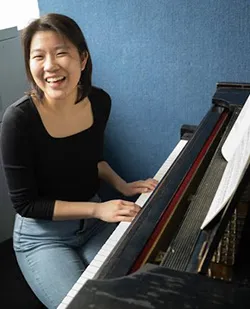
By Bohou Zhang ’27
Growing up in the area, Lauren Park '24 had no doubt in her mind that she wanted to study music at Swarthmore College. “The main reason I came here is because of the people,” she says. “I’ve always had such wonderful relationships with those at Swarthmore.”
As a child whose parents both loved classical music, she would often listen to her father play John Field’s Nocturnes or recordings of Chopin’s piano pieces on her way to school. “I started taking private piano lessons when I was 7,” Park says. She continued with piano lessons, began viola lessons at age 8, and by high school had joined the Delaware County Youth Orchestra, playing under the baton of Swarthmore College’s Andrew Hauze ‘04.
Professor Hauze wasn’t the only person from Swarthmore that Park had ties with before entering the College. Living in the area allowed her to develop close bonds with many faculty members and students as she grew up. “My babysitters, my tutors . . . they were all Swarthmore students, ” she recalls. “I would come to McCabe as a ten-year-old to meet with my French tutor. ” So when the time came to apply for college, she knew she wanted to study at Swarthmore, and she knew what to expect when she got here. “I remember writing in one of my essays about how I looked forward to giving a lunch hour concert in Parrish,” she chuckles, “but I’ll only be giving my first one here this month. It's kind of sad that it took me this long.” Park will be performing her lunch hour concert at 12:30 pm on April 22 in Lang Concert Hall with Professor Hauze and Greg Boatman ‘23.
Her time at Swarthmore has fortunately coincided with the completed renovations to the pipe organ in Lang Concert Hall. “I didn’t anticipate learning how to [play the] organ,” she says. “I just heard that they were restoring [it] and so I thought, why not?” Park sought out organ lessons with the help of Professor Hauze her sophomore year, and has since begun playing organ repertoire from the Baroque period to the twentieth century, working as a church organist, and examining religious applications of the instrument.
Seeking to explore her spirituality through the music she performs, Park has been playing services at local Episcopal and Presbyterian churches and has decided to focus her senior thesis around contemporary Roman Catholic church music after the reforms of Vatican II. “Besides just playing these instruments,” Park says, “I’ve also always been so interested in the stories behind them. It’s what drove me to pursue music history here [at Swarthmore] and what I’ll be doing my Ph.D in after graduating.” Her main research interests lie in examining musical exoticism, focusing on seventeenth- and eighteenth-century French operas that portray human subjects foreign to their creators.
Ultimately, Park’s time in the Swarthmore Music Department has helped her grow as both an individual and a musician. She cites Professor Barbara Milewski and Professor James Blasina as major influences on her development. “Barbara and Jamie are both amazing mentors that helped guide me through my time here,” she says. “They know what scholarship has been published and what there is to do, and they care greatly about students to help them with development of that scholarship.” Having taken classes with both professors, she's been able to fulfill her passion for music history and gain insights into the direction she hopes to take her research. The consideration and care she has felt from the faculty and her peers has pushed her to continue on a path of teaching and academia.
After Swarthmore, Park will pursue her Ph.D in Musicology at Princeton University. “I hope I can become a professor after I finish my degree,” she says. “I would also love to be a university librarian, or become a high school history teacher. Anything that would allow me to continue teaching would be great.”
As she recalls her time with her professors, her peers, and performing and studying the music that she loves, Park smiles. “Who they are as people really helped me decide what I wanted to do,” she says. “I really can’t think of anything I would change.”
Mark Reyes ’24
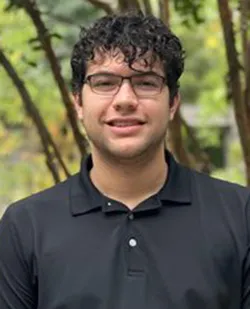
By Chung Sze Kwok ’27
Composer, conductor, and pianist are only a few of the many hats worn by Mark Reyes ’24. From his early pandemic days as a clarinetist in Swarthmore’s Zoom Orchestra to composing an entirely student-led musical — Ashes of Fate, performed in the spring of 2024 — it is safe to say that Reyes has fully immersed himself into all that Swarthmore Music has to offer.
Music has been a part of Reyes’s life long before he stepped foot on Swarthmore’s Campus. “For as long as I can recall, I have always been doing music in some way,” he said, expressing his gratitude for the music-making opportunities he has had since the age of four. He credits his early involvement to Kindermusik, a youth music program run by a family friend, and private piano lessons: “I still have my old notebooks from 2007 with practice notes.” After realizing that he enjoyed playing the recorder in elementary school, he moved to the clarinet because it “seemed like a big recorder.” He then took on the bass clarinet and percussion in middle school, teaching himself the bass guitar and the drum set along the way.
In Reyes’ sophomore year of high school, he played the tenor drums in the drumline, performing at football games and shows. He had “an amazing time” learning “drill and drumline cadences,” but what made the experience special was “the bonds you create with fellow [drummers].” He explained that “the way the drumline works is like a unit . . . you have to be really keyed into what everyone else is doing.”
This sense of camaraderie exemplifies the kind of college experience Reyes searched for as a high school senior. Though he “knew Swarthmore had a solid music program,” it was the tight-knit community and small class size that drew him here. Starting at Swarthmore in the midst of the pandemic was no easy feat, but that did not deter Reyes from playing the clarinet for the Zoom orchestra and forming friendships with fellow musicians. Through his continued involvement in the department, including the Chinese Music Ensemble, the Chorus, and Music 48 (private music lessons), Reyes decided to become a Music major. More recently he added a Linguistics minor to his studies.
In the fall of 2022, Reyes participated in the Fetter Chamber Music Program alongside Whitney Grinnage-Cassidy ’24, whom he has been good friends with since his first year at Swarthmore. Their performance of four songs by Florence Price, featuring Reyes on the piano and Grinnage-Cassidy on vocals, remains a highlight for Reyes. In particular, Reyes recalls the positive influence of instructor Debra Scurto-Davis: “She helped me a lot not only with the musical aspects [on the piano], but also in terms of my mindset… she would remind me to relax, mellow out and accept the music when I was trying so hard to get it right.”
While Reyes’s music career at Swarthmore has been marked by plenty of performance, his passion lies in creating his own music. Conducting and Orchestration with Professor Andrew Hauze ’04 was particularly inspiring: “I was able to learn practical skills that I can see myself using in the future as a composer… [as] orchestration goes hand-in-hand with composing and arranging.” Part of the course involved either arranging a piece or composing something new; Reyes opted for the latter, and was able to hear his pieces performed live by musicians from the College. During that same semester, Reyes coincidentally received a last-minute emergency call to stand in as a conductor for the spring production of the musical Heathers: “It was quite the experience; I was learning as I went, and I was pretty new to theater.”
Theater is no longer new to Reyes; in fact, he has been pouring his time and energy into a large-scale theatrical passion project: composing the entirety of Ashes of Fate, an student-led musical written by Anastasia Lewis ’24.
“Around this time last year, I was looking for some experience here at the College as a composer, since that’s what I want to do later in life.” Lewis, a Film and Media Studies major said in the fall of 2023. Reyes, a good friends, came to mind as someone to ask. At that point, she showed him a script, the opening of which was inspired by the song and staging of A Rumor in St. Petersburg from the musical Anastasia. “I drew on the darker-sounding opening of the song… [and] could hear an idea in my head, so I went to the piano and started writing a vocal melody.” Reyes then played his ideas to Lewis, who immediately took him on as the musical’s composer. His initial idea has since evolved into Come Get Me, now the opening song of Ashes of Fate. From there, the process unfolded quite organically, with rehearsals now in full swing in preparation for performances in the spring. This time, Kate Carlyle ’24 will be conducting, with Reyes on the piano. “It’s a big undertaking,” Reyes acknowledged, “but I’m 100% going to be extremely happy I did this when all the work is done.”
Eric Trinh ’24
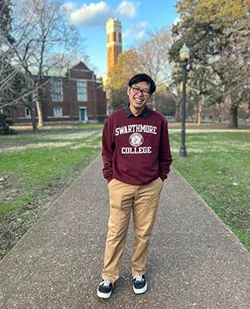
By Nina Sablan ’27
“Everyone brings their own meaning to music,” says Eric Trinh ‘24. As a composer, he encourages performers to interpret his music their own way: “I'm intentional with the meaning that I'm trying to convey, but if someone wants to interpret it a separate way, I can't stop that.”
Trinh started with piano and chorus in elementary school and has been singing ever since. He remained in chorus through high school and joined musical theater. At Swarthmore, Trinh is a political science major and music minor. Outside of music his “interest throughout life has been voting and American politics.” This has served as the topic of his senior comprehensive, which is on the voting patterns of Asian Americans in rural areas.
“Choruses were really important for me [in college] to find community and friends freshman year and beyond,” says Trinh. Half of his music experience at Swarthmore has been with groups such as Chorus, Garnet Singers, and the Offbeat acapella group. The other half has been dedicated to voice lessons. After eight semesters with Lara Nie, he’s grateful for her mentorship, saying, “She’s helped me find my voice and also helped me explore who I am as a person.”
Another important mentor in Trinh’s Swarthmore journey is the former chorus director, Joseph Gregorio. “[Gregorio] gave me the confidence that I can compose, and the opportunity to get to know a lot of people and sing for hours on a Wednesday night,” Trinh says. In his sophomore spring, Gregorio encouraged Trinh to write his first composition, a piece based on a Dorothy Parker poem, for the chorus in the spring of his sophomore year.
After graduation, Trinh plans on becoming a social studies teacher. Although that seems to have little in common with singing, he says his music department mentors have had an important role in shaping his career. His political science major has prepared him for the academic side of the job, while his music minor has introduced him to teaching styles he might one day use in his own classroom. “Being in the music department and around music, I’ve been exposed to a lot of different teaching styles from directors, conductors, and voice teachers,” he explains. He hopes to translate these teaching methods across disciplines. “It’s been helpful to me,” he says, “thinking about how different teaching styles work in a musical setting and how that can apply to being a social studies teacher.”
Trinh says, “[Music] is a way of expressing yourself, and of seeing how other people express themselves, which is especially true for a choral setting.” He keeps this in mind when he sings and composes — talents which will feature in Trinh’s senior recital. Trinh will sing pieces by Mozart and Copland, and two of his original compositions will be performed by a group of Swarthmore students. One of the compositions, “The Story of Mrs. W,” is the piece he wrote for chorus sophomore year. The second, “O Loving Father,” is based on a poem his high school math teacher wrote and gave to him as a parting gift. Trinh composed this piece as a last hurrah for his school, which is closing down this year.
Additional music senior stories will be published in the following week.



